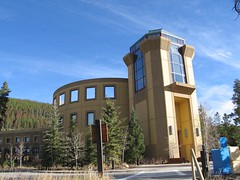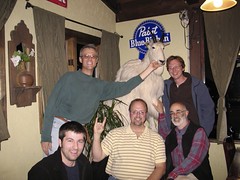Here's a few pictures from the last few days - including a few shots while driving up yesterday. One thing that's interesting about this conference is there's a huge contingent of Tapestry users and enthusiasts.



Simon used to work for IBM, on a video conferencing product. In 1994, Simon would fly all over the world to tell everyone about it. The last 10 years have brought many changes. When Simon used to travel in 1994, he needed cash and travellers checks, airline tickets, telephone kiosks and sent mail through the regular ol' postal system. Fast forward to 2004, and we have ATM cards and a "global identity card" (a Visa card), e-tickets, GSM mobile phones and e-mail. We're now in the participation age.
If we were massively connected:
Security would no longer concern only boundaries. Before the participation age, security was a matter of "how do I keep you out". Now it's "who are you can you prove that". It's all about digital identity now.
Software would have nowhere and everyone to run. Service orientation is how software is build today. Simon believes it'll happen through REST-based services, rather than by employing web services.
Software pricing should not track ephemera [definition]. We're now switching to value-based pricing.
Markets would become conversations (from The Cluetrain Manifesto). This idea led Simon to start blogs.sun.com.
Closed-room development would be insufficient. The old way was lock smart people in a room and slide pizza under the door - and then charge others admission fees to watch them work. Software that's developed out in the open gets better and better b/c you can get all the experts working on it. This is called Open Source. The initial objective of Open Source was to undermine companies like Microsoft and Sun - but now it's the best way to write software in a connected society.
Open Source in a Nutshell: a community of developers, sharing a code commons, create "wealth" from the commons, enriching the commons in the process. The "craft guilds" have been rediscovered in a sense. Open source is not communism, but more like Connected Capitalism.
There are a number of different open source licenses:
- Class A: "Unrestricted", create any work, no restrictions on licensing. BSD-style license, with the gold standard being the Apache License.
- Class B: "File-based", files derived from commons must use license B, files added may use any license. Mozilla-style, CDDL v1.
- Class C: "Project-based", all files in project must use license C if any files use commons files, GPL.
According to Simon, the best license is the one that gives the most freedom to the most people. Class A licenses promote freedom to innovate, but do not protect the commons. Class C licenses promote constant growth of the commons but limit the freedom of the developer to use their own innovation however they want. Class B licenses balance both freedoms protecting and enriching the commons but leaving innovators free to use their work in any commons.
The overlooked corners of open source: it's not licenses, there's no more limelight needed for those. However, there is a problem now - and that's license proliferation. There's too many licenses, we need fewer so it's easier to choose. We need better motivational models: how do we leave room for the motivations of diverse contributors?
The overlooked corner of open source is Governance. Apache is a good example of how Governance should be done. Bad governance is the primary vector for disease in open source. If the only way to contribute back is to go through one company that chooses committers, the project is likely doomed.
Software Patents happen, get over it. "Parallel Filing" means Corporations own patents on pretty much anything they touch. If you don't, your competitor will. The nature of US law means all must play. Using patents defensively is a routine element of corporation-to-corporation interaction. Software patents are a zone on the continuum - even their detractors have to deal with them. Until world trade is reformed, software patents happen.
So how do you protect yourself?
- Patent Grants: Research specific patents and give a broad usage grant to open source use.
- Compulsory licensing: Blanket grant of patents, restricted to licensed code. This is the strategy that Sun has used with OpenSolaris.
- Non-Assert Covenants: Covenant not to assert rights against bona fides community.
Simon believes all 3 approaches are needed to protect ourselves from software patents. He believes that #2 and #3 should be mandatory for standards bodies and open source projects.
Summary: The next phase of F/L/OSS is upon us. The Virtuous Cycle of open source needs a health check. We need to reduce license proliferation by dealing with its causes. We need to leave room for the motivations of all contributors. Don't sacrifice the freedom of developers for an ideology. Governance best practice needs an advocate.
F/L/OSS Alone is not enough for freedom - we need standards. Open standards set end users free to choose. Development and deployment are not the same thing. Standard Formats + Open Source = Freedom.
Software Patents demand multiple defenses. We need to lobby the governing bodies of our countries and put a stop to patents.




